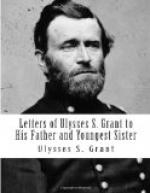I try to write home about once in two weeks and think I keep it up pretty well. I wrote to you directly after the battle of Belmont, and Lagow and Julia have each written since.
Give my love to all at home. I am very glad to get letters from home and will write as often as I can. I am somewhat troubled lest I lose my command here, though I believe my administration has given general satisfaction not only to those over me but to all concerned. This is the most important command within the department however, and will probably be given to the senior officer next to General Halleck himself.
There are not so many brigadier generals in the army as there are brigades, and as to divisions they are nearly all commanded by brigadiers.
Yours,
ULYSSES.
[Footnote 1: Grant’s conviction that the essential purpose of the war was not the abolition of slavery as an end in itself, but the preservation of the Union at all costs was identical with that of Lincoln. This letter can properly be compared with the well-known letter written by Lincoln to Greeley on the third of August, 1862, in which Lincoln says: “My paramount object in this struggle is to save the Union, and it is not either to save or to destroy slavery.” Lincoln understood that the task accepted by him as President as the leader in the contest for national existence made the maintenance of the Union his chief, if not for the time being his only responsibility. He had, however, placed himself on record in many utterances to the effect that if the republic were to be preserved, slavery must be, in the first place, restricted, and finally destroyed. It is probable that in this matter Grant did not go so far as Lincoln. In any case, in common with the President, he devoted himself simply to the duty immediately before him.]
[The battlefield referred to is Belmont. According to the Memoirs, the loss of national troops, killed, wounded, and missing, was 485; that of the Confederates, 642. Number of Union troops engaged was 2500 men; that of Confederates, 7000.]
Cairo, Illinois,
November 28th, 1861.
DEAR FATHER:
Your letter asking if Mr. Leathers can be passed South, and also enclosing two extracts from papers is received.
It is entirely out of the question to pass persons South. We have many Union Men sacrificing their lives now from exposure as well as battle, in a cause brought about by secession, and it is necessary for the security of the thousands still exposed that all communication should be cut off between the two sections.




